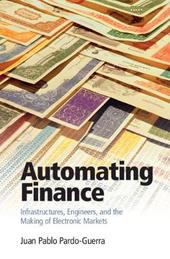
|
Automating Finance: Infrastructures, Engineers, and the Making of Electronic Markets
Hardback
Main Details
| Title |
Automating Finance: Infrastructures, Engineers, and the Making of Electronic Markets
|
| Authors and Contributors |
By (author) Juan Pablo Pardo-Guerra
|
| Physical Properties |
| Format:Hardback | | Pages:370 | | Dimensions(mm): Height 235,Width 156 |
|
| Category/Genre | International finance
Economic history
Finance |
|---|
| ISBN/Barcode |
9781108496421
|
| Classifications | Dewey:332.640285 |
|---|
| Audience | | Professional & Vocational | |
|---|
| Illustrations |
Worked examples or Exercises; 2 Tables, black and white; 14 Halftones, black and white; 9 Line drawings, black and white
|
|
Publishing Details |
| Publisher |
Cambridge University Press
|
| Imprint |
Cambridge University Press
|
| Publication Date |
16 May 2019 |
| Publication Country |
United Kingdom
|
Description
Trading floors are a thing of the past. Thanks to a combination of computers, high-speed networks and algorithms, millions of financial transactions now happen in fractions of a second. This book studies the automation of stock markets in the United Kingdom and the United States of America, identifying the invisible actors, devices, and politics that were central to the creation of electronic trading. In addition to offering a detailed account of how stock exchanges wrestled with technology, the book also invites readers to rethink the nature of markets in modern societies. Markets, it argues, are sites for the creation of relations, and in studying how these relations changed through technology, the book highlights the sources, dynamics, and consequences of automation. In this respect, the book is both a history of automation in finance and a sociological analysis of the way in which automation gradually changed the lives and work of key financial actors.
Author Biography
Juan Pablo Pardo-Guerra is Assistant Professor in Sociology at the University of California, San Diego. Building on an early interest in econophysics and artificial financial markets, his work covers the history of technology in financial markets, the sociology of art markets, and the use of computational methods in social science.
Reviews'Automating Finance is relevant for researchers and students of economic sociology, but its contributions travel beyond this with tremendous implications for other fields, including management,organisational sociology, public administration and public policy. Finance professionals would also enjoy the book, as they could learn how technical entrepreneurs manoeuvred through institutional,structural and organisational dynamics in automating finance.' M. Kerem Coban, LSE Review of Books '... the book is wide-ranging in both its theoretical inspirations and the empirical details it develops. What the book conveys extremely well is precisely how modern markets are produced by multiple moral, political, and organizational struggles.' Nahoko Kameo, American Journal of Sociology
|